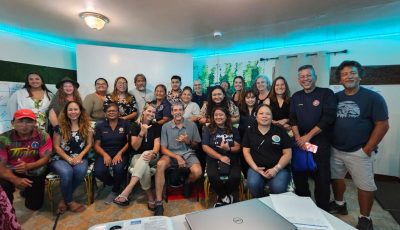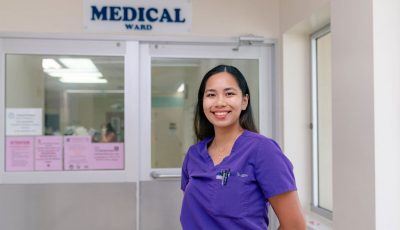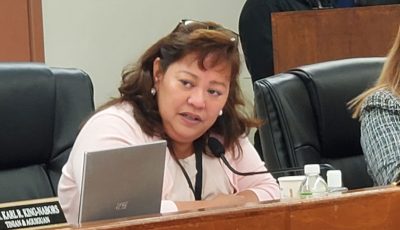CHCC asks for $116.8M budget for FY 2023
The Commonwealth Healthcare Corp. is asking for a budget of $116.8 million for fiscal year 2023, even as CHCC chief executive officer Esther L. Muna also pointed out yesterday that policies such as the “touchback” requirement for foreign workers and lack of sufficient funding make it difficult for them to recruit and retain nurses.
House of Representatives Ways and Means Committee chair Rep. Donald M. Manglona (Ind-Rota) also disclosed at yesterday’s budget hearing for CHCC that CHCC was not included in the administration’s original budget submission. He said they anticipate CHCC’s budget request to be included in the administration’s revised budget submission, which they expect to receive by July 1.
He said that CHCC did provide the Legislature with what they have in regards to their budget request: In total, CHCC is requesting $116,811,509 for the upcoming fiscal year. Of that amount, $71.7 million will be allocated for personnel, $41.3 million for operations, and $3.78 million for utilities.
Manglona said the agency’s combined “all other expenses” comes to a total of roughly $45.1 million.
In addition, he said, CHCC projects they will receive $93,903,284 in total revenue collections throughout 2023 fiscal year, derived from five revenue funding sources within the agency.
He said $92 million of all projected revenue collections would come from revenue sources on Saipan, with the remaining amount provided by the agency’s public health program, Bureau of Environmental Health, Medicaid, Rota and Tinian.
With a budget request of $116.8 million and $92 million projected revenue collections, Manglona said that CHCC would still be short by about $22.9 million. He said CHCC requests that this $22.9 million be provided through a local appropriation.
Of this amount, Manglona said, $8.2 million will be used to provide funding for 166 new full-time employees that CHCC seeks to employ this coming fiscal year.
“The remaining amount of this request shall be used to cover various expenses, including the increased costs of medication for oncology patients, funding for utilities and capital improvements,” Manglona said.
Muña told the Ways and Means Committee that the budget approved by the CHCC board of trustees represents continuous improvements for the hospital and health system.
Muña said they have added a radiologist and cardiologist to their staff and that this is on top of their only other specialists—an oncologist, nephrologist, otolaryngologist, and orthopedic surgeon.
“All come with a heavy price tag but are still not near what is offered and paid for in other U.S. hospitals,” she said.
The CHCC CEO said expanding services in their health system is critical to improving the health and livelihoods of all people who live in the CNMI.
“But just like any hospital, we have to spend first to get paid. We have to spend on personnel, equipment, and support services, including nursing, maintenance, and billers,” she said.
Muña said that’s specifically difficult when CHCC never really had a proper investment from the CNMI government for health.
That’s difficult, she said, when there are Medicaid policies that provide high matching percentage by the local government or that the local government consistently does not match the territorial share.
“It’s difficult when you have policies that make it difficult for us to recruit and retain nurses, such as the ‘touchback’ regulation and lack of appropriation,” Muña said.
“Touchback” refers to a brief period when certain foreign workers are required to exit the CNMI and return to their home country after a certain number of renewals of their work visas. Some workers will be affected by the provision starting next year.
Muña said it’s been challenging for CHCC when they have personnel experiencing burnout during the COVID-19 response, such that a decision to leave CHCC and the CNMI is easier to make.
She said one of the most valuable and cost-effective ways to improve a person’s health and well-being is health promotion and disease prevention.
“It’s difficult to provide adequate health promotion and disease promotion when there’s this myth that the federal government will pay for everything,” the CEO said.
Muña noted that even the federal Infrastructure Act has no special grant to build a new hospital.
She said CNMI needs an upgraded hospital facility.
CHCC has added more personnel from health equity grants and grants that emphasize public health and mental health.
“We need more surgical suites and more rooms dedicated to intensive care needs,” Muña said.
She said the amount that they’re asking for is tremendous and that they based this on the needs of the community.
“Please consider this as an investment. Think of what we can achieve for our people. Think of providing us the tools to combat health issues affecting our people and providing much medical treatment,” Muña said the lawmakers.
At the budget hearing, CHCC chief financial officer Perlie Santos made a presentation on their budget needs and requests. She explained, among other things, as to why the CNMI government must provide adequate funding for health in the Commonwealth.



























